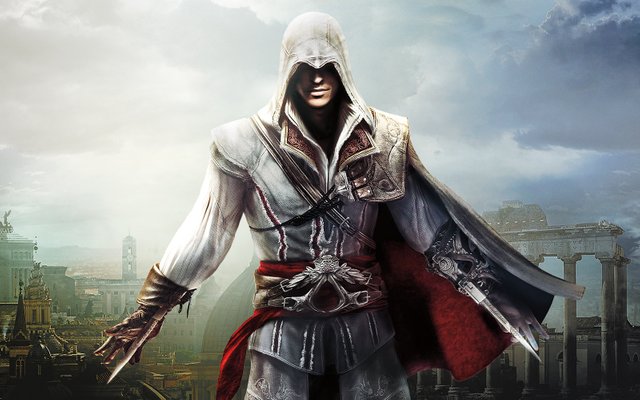Assassin's Creed Retrospective: Part 1
Assassin's Creed has been a rather unique franchise. In the last 13 years, no other series has evolved and transformed quite like Assassin's Creed, while a the same time maintaining lore and thematic consistency.
Assassin's Creed (2007)
Ubisoft's Prince of Persia games in the early-to-mid 2000s were highly successful in reinvigorating the franchise. Yet, they wanted to expand some of the ideas into a new IP. The first Assassin's Creed was a rather curious concoction. Of course, it had mechanical similarities to Prince of Persia, but the sci-fi framing device, historical setting, focus on acrobatics and stealth in an open-ish world was quite the ambitious undertaking. Ultimately, the first game had too many rough edges, pacing issues, and a general inconsistency.
Still, it set the stage. It's interesting to see how many of the core themes of Assassin's Creed were already established then. The millennia long battle between freedom-seeking assassins and control-seeking templars - though both ultimately looking for peace. The inclusion of myths and legends, combined with history. It was all there from the beginning.
Assassin's Creed II (2009)
Despite the first game's flaws, Ubisoft was wise to recognize the immense potential this promising new IP offered. They set two alternating teams at Ubisoft Montreal to work on two games simultaneously on a two year schedule. This way, Assassin's Creed was pitched to become Ubisoft's flagship franchise, with an entry every year.

Assassin's Creed II was a remarkable evolution from the first game. It addressed nearly every criticism, while expanding the formula in unexpected ways. It set in motion an intriguing narrative that'll simultaneously unfold in the modern times, as well as the historical times. The setting of renaissance Italy was far more interesting than the Third Crusade. Most importantly, it introduced a delightful new protagonist - Ezio.
The open worlds took a major leap forward in every way, and alongside it so did the freeform yet now focused and directed gameplay. Everything came together beautifully in what is till this day regarded as the quintessential Assassin's Creed game.

Assassin's Creed: Brotherhood (2010)
Brotherhood was developed parallelly to II, with a different team at the same studio, Ubisoft Montreal. Of course, the two share a lot in common, with very similar mechanics and visuals using the same engine. It carried forward Ezio's story and is very much a direct continuation to II.
As great as II was, some of the modern stuff just didn't live up to the historical setting. Brotherhood remedied this with much more interesting and varied modern gameplay and missions. The modern story also took centrestage, building up to 2012. Brotherhood's Rome was incredible, and even better than II's Florence. The gameplay was further refined in what was already a finely tuned stealth action game. This was also the first game in the series that established a penchant for exploring historical figures in rather interesting ways.

However, not everything with Brotherhood improved over II. The overall narrative wasn't quite as engrossing, some of the mission design did feel too similar to II at times, and there were some pacing issues. Still, Brotherhood was an excellent follow-up to II, and a worthy continuation of Ezio's story.
Assassin's Creed: Revelations (2011)
There were minor signs in Brotherhood that the yearly cadence was hurting innovation. Assassin's Creed II was a giant step forward from the first game, while Brotherhood was a fairly minor evolution. The overall quality of the game meant it was never a big issue. However, in Revelations, the perceived stagnation did become an issue. Ezio's return in his old age was wonderfully done, as were many of the narrative moments, and... revelations. Constantinople was the series' largest world yet, albeit not quite as marvelous as Rome.
However, the gameplay and mission design were by this time starting to show signs of fatigue. There's also a sense through the game that some content was rushed, some was cut, to make the yearly cadence. Series creator Patrice Desilets left Ubisoft around this time, and for the first time in years, the future of the franchise was in doubt.

Revelations isn't quite the swansong Ezio deserved, but taken as a trilogy, these three games were remarkable and replaying the remastered versions, they have certainly stood the test of time.
Assassin's Creed III was deep into development, but it was clear that changes were necessary. More on all of that to come in future parts.
(Cross-posted from Hive Gaming)